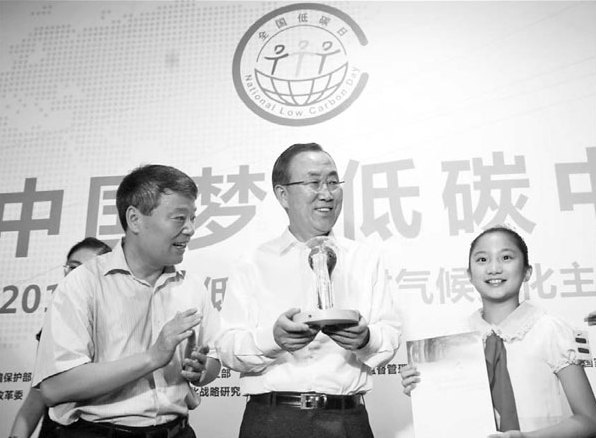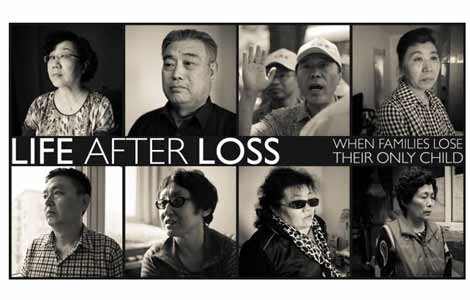EU firms eye China's clean-tech market
Updated: 2013-10-04 07:20
By Cecily Liu and Tuo Yannan (China Daily)
|
||||||||
|
UN Secretary-General Ban Ki-moon receives an outdated incandescent light bulb from a student of the elementary school affiliated to Renmin University of China in a presentation aimed at raising awareness of cutting carbon emissions. Xu Jingxing / China Daily |
European environmental companies lend a helping hand to reduce the nation's carbon footprint
An increasing amount of energy needed to fuel China's urbanization has caused serious concerns about carbon emissions and environmental pollution, but also opened up a market for some of the best clean-technology companies in Europe.
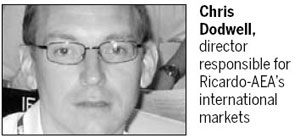
China overtook the United States as the world's largest producer of carbon emissions in 2007, and two years later its energy consumption also surpassed that of the US to become the largest.
When the World Bank identified the 20 most polluted cities in the world, 16 were in China. The severity of China's pollution was further highlighted by this January's heavy smog in Beijing, when the level of PM2.5 (air pollutants with a diameter of 2.5 micrometers or less) at its peak was 36 times higher than the World Health Organization's recommended standard.
"Energy consumption and emissions generally rise during a country's urbanization process due to rising income levels. When we are traveling or entertaining ourselves in the cities, energy consumption increases," said Jonathan Woetzel, director of McKinsey & Co in China.

Encouragingly, the Chinese government has actively introduced policies to tackle emissions, and one successful example is China's Top-1,000 Energy Consuming Enterprises Program, Woetzel said.
Implemented as a part of China's 11th Five Year Plan (2006-10), the program helped China's largest 1,000 companies achieve a total energy saving of 150 million tons of coal equivalent (Mtce) during the five-year period, surpassing its target of 100 Mtce. In 2012, China consumed 3,620 Mtce.
Woetzel said that other key areas China should focus on to improve energy efficiency are buildings and private vehicles.
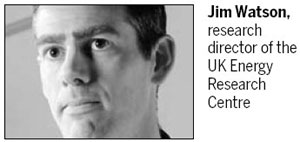
"A lot of old buildings are energy intensive and they need more energy-efficient insulation for windows, better use of combined heating, and more efficient central heating in some areas in the north in particular," he said.
Pollution resulting from urbanization is not specific to China. Some of the early-industrialized countries such as the United Kingdom and Germany have gone through the same path and learned lessons the hard way.
"Like China, the UK also experienced development first and implemented environmental protection measures later," said Jim Watson, research director of the UK Energy Research Centre.
Watson said that Britain relied heavily on coal for its urbanization, which caused air pollution, but major changes happened with the implementation of the Clean Air Act in 1956.
One key measure introduced by the Act was designating "smoke control areas" in some towns and cities where only smokeless fuels could be burnt. It also led to the relocating of power stations away from cities, and increased the height of some chimneys.
Watson said the UK significantly reduced domestic reliance on coal by switching to gas in the 50s, which was supported by government incentives to develop gas resources in the North Sea.
"When the domestic sector made the shift to gas in the 50s, it was still expensive. But when the British industries made the shift mainly in the 90s, gas became a lot cheaper. So what drove it was an economic advantage," Watson said.
"The challenge for China to make a similar shift is lack of access to gas at reasonable prices. China has done well to develop renewable energies, but they are still not at a capacity big enough to replace coal."
Coal currently accounts for 60 percent of China's energy consumption, while oil and natural gas together account for 20 percent.

Germany is another country that has introduced powerful measures to clean up pollution incurred early in the urbanization process.
Marco Voigt, managing director of VKPartner, a German clean-technology consultancy, said an "environmental awakening" came about in the 1980s and 1990s when pioneering studies on air and water quality in Germany's industrial Ruhr area were published.
"These paradigm-shifting studies drew attention to the shocking effects of pollutants on local forests, fish and water resources, which are influential factors in social, economic and political vitality," Voigt said.
To reduce pollution, the German government invested heavily in public transport and pedestrian and bicycle network systems to reduce vehicle emissions. In recent years, new regulations were also introduced to prohibit polluting automobiles from entering Germany's largest cities, he said.
Regulations on recycling systems to prevent harmful substances from entering landfills were also introduced with strict monitoring. The formerly polluted Ruhr area has since undergone rigorous urban renewal, Voigt said.
Europe's increasingly ambitious goals to reduce emissions has produced many globally leading businesses in the clean-tech and energy efficiency field, and many of them are now keen to bring their technologies and expertise to China.
One example is Ricardo-AEA, a subsidiary of the British engineering consultancy Ricardo. With extensive experience advising the British and other European governments on achieving emission reductions targets, Ricardo-AEA is keen to help the Chinese government do the same, said managing director Robert Bell.
"When devising policies, you wouldn't just be looking at energy alone, because energy, climate change, air quality, waste management, transport and other factors all interact. We have approaches which look at all of these interactions, and so provide cities with an optimal way forward," Bell said.
A recent project Ricardo-AEA completed in China in cooperation with Tsinghua University is a study of how ready the Chinese cities in Guangdong, Hubei and Chongqing are for developing carbon-trading markets.
"We were looking at the issues that needed to be addressed to implement the pilot schemes most effectively, which are, how to collect data and use it to set robust caps on emissions, as well as their approach to enforcement," said Chris Dodwell, the director responsible for Ricardo-AEA's international markets.
Dodwell said that measurements of baseline data of industrial activities are also key to setting carbon prices in an effective carbon trading market, and this is also expertise that Ricardo-AEA can help China with.
Another policy Ricardo-AEA helped the UK government introduce, which Dodwell said could help China, is the Climate Change Agreements, which allows eligible energy-intensive businesses to receive tax discounts on energy delivered to non-domestic users, in return for meeting energy efficiency targets.
"Industry energy efficiency is a main issue China needs to grapple with, and we can help China develop policies which can save businesses money as well as reduce energy demand," he said.
Another company that has found a market helping China reduce emissions is the British engineering company Mahle Powertrain, which has worked with many Chinese automotive companies to develop energy-efficient engines.
Marco Warth, the company's engineering director, said that Mahle Powertrain's competitive advantage in China is its experience in Europe, where stricter emission standards mean leading technologies are developed more quickly.
He said China's current laws on emissions standards are similar to the legislation known as Euro 4, whereas Europe adopted a new iteration of the standard, Euro 5, in 2008 and will adopt the more stringent Euro 6 next year.
"Many of our Chinese clients are taking a long-term view to adapt to higher standards voluntarily, in anticipation of future regulation changes," Warth said.
"They think, 'It's Euro 4 now, but with the pace of change we see in China, especially in big cities, the government may put in place some legislation before the countryside does. So we'll aim for Euro 5 or even Euro 6'," he said.
Contact the writers at cecily.liu@chinadaily.com.cn and tuoyannan@chinadaily.com.cn
Susanna Ma contributed to this story.
(China Daily USA 10/04/2013 page5)

 Driver shot dead in car chase at US Capitol
Driver shot dead in car chase at US Capitol
 NY SUV driver's wife: We were in 'grave danger'
NY SUV driver's wife: We were in 'grave danger'
 Death toll in sunk boat off Italy could top 200
Death toll in sunk boat off Italy could top 200
 A southern staple
A southern staple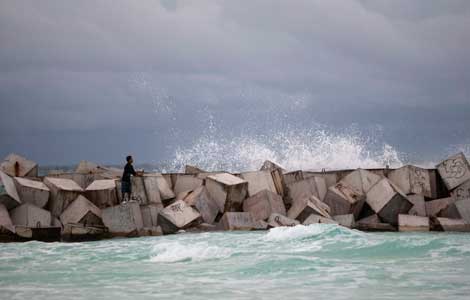
 Tropical Storm Karen aims for US Gulf Coast
Tropical Storm Karen aims for US Gulf Coast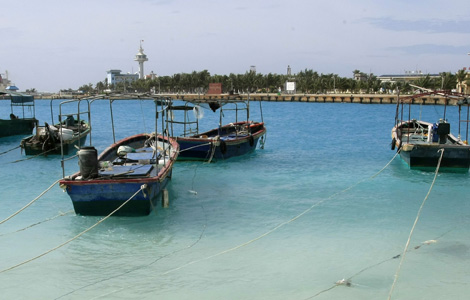
 City rush, island time
City rush, island time
 Death toll in Italy migrant boat wreck rises to 94
Death toll in Italy migrant boat wreck rises to 94
 Lang Lang: First Chinese winner of Classic Brits Award
Lang Lang: First Chinese winner of Classic Brits Award
Most Viewed
Editor's Picks

|

|

|

|

|

|
Today's Top News
DC shutdown gets social media all in a twitter
Hotels aside, AVIC needs to grow its service arm
Gunfire forces brief lockdown at US Capitol
Mutual help the best: IMF chief
A new 'maritime silk road' called for
Chinese investment in US grows
'Bourgeoise' iPhone rules
Obama cancels APEC trip due to gov't shutdown
US Weekly

|

|
